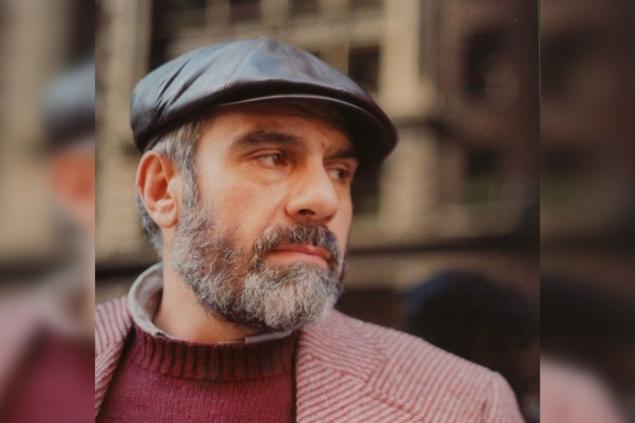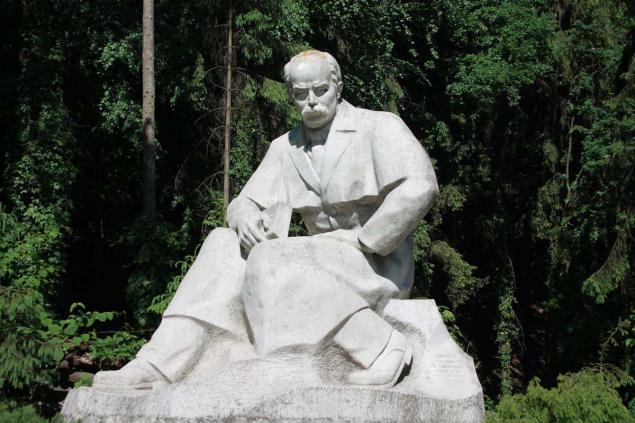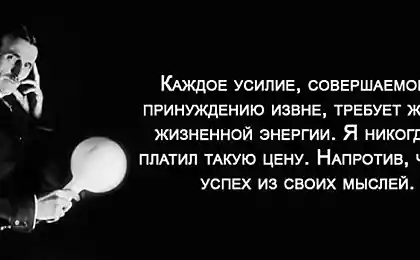227
What thoughts Sergey Dovlatov became uncomfortable in his country and why he left it
Emigration of Russian Writers It began in 1918 and lasted until the 90s. People had many reasons to leave Soviet Russia, and some were forcibly expelled. Unpleasing to the state, the intelligentsia continued to create in Europe, Canada, China and the United States. One of its representatives was the famous writer Sergey Dovlatov.

Instagram / @sergej.dovlatov Editorial "Site" He will tell you why the publicist decided to leave the USSR and why this topic is relevant now. We will also share the instructive story of Taras Shevchenko, who at one time greatly influenced Dovlatov’s worldview.
It is difficult to say at what point Dovlatov decided to connect his life with creativity. However, in the circle of poets and writers, he began to be in his student years. First, Sergey studied for 2 years at the philological faculty of Leningrad State University. However, the study of the specialized Finnish language did not much fascinate the future creator. Due to the failure of the student was expelled from the university.

Instagram / @poet.na.meste After that, Dovlatov spent 3 years in service in the internal troops in the protection of penal colonies of the Republic of Komi. When he came back, he was a completely different person. Then Sergey entered the Faculty of Journalism of SPbU. As a student, he worked for a local newspaper and wrote short stories.
After graduating from the university, Dovlatov was taken to work in the newspaper “The Banner of Progress”, and was also invited to the literary group “Citizens”. In addition, he was the literary secretary of the famous Soviet writer Vera Panova. For several years Sergey lived in Estonia, where he managed to get a Tallinn residence permit and prestigious work in various publications.

Instagram / @sergej.dovlatov Journalism showed the Dovlatov world from different angles. Personal stories, as well as journalistic practice of colleagues of Sergey formed the basis of his book “Compromise”. However, the louder the writer declared himself, the more the authorities began to monitor him. For example, it came to the point that on the orders of the KGB, Dovlatov’s first book “Five Corners” was destroyed.
Soon the writer returned to St. Petersburg and continued his journalistic activities. In parallel, he wrote prose. However, magazines refused to publish his work for ideological reasons. In 1976, Dovlatov was expelled from the Union of Journalists of the USSR. And after 2 years, the persecution of the authorities reached its climax: Sergey decided to leave the country.
350,000.
Instagram / @sergej.dovlatov Dovlatov emigrated to the United States and soon received the post of editor-in-chief of the weekly newspaper “New American”. The writer became an integral part of the emigrant community of that time. He was not only a successful journalist, but also a respected writer. One by one, his stories began to be published in such famous magazines as Partisan Review and The New Yorker. During his life abroad, Dovlatov published 12 full-fledged books.
From writing in the Soviet Union Sergey renounced forever. Moreover, in his will he prescribed a total ban on printing any text written during his life in the USSR. Although he himself published early texts, he had previously rewrote them.
Emigration of Russian writers: the worldview of Sergei Dovlatov The writer’s worldview was reflected in his works. In Dovlatov’s stories there were no bad and good heroes. But they could be, depending on how you look at them. This is the main truth of life, according to Sergey. Therefore, he never tried to become a teacher or mentor for his reader. After reading a book, people decided which side to take.

Instagram / @zhivym In his collection “March of the Lonely”, Dovlatov once wrote that he was very much influenced by the story of the famous Ukrainian writer Taras Shevchenko. As you know, he kept a personal diary, the records of which are preserved. Here's one of them.
“I walked along the seafront in December. I'll meet you barefoot. Says Altyn. I was too lazy to unbutton the scroll. God, I say he will. Going on, I hear water splashing. I'm coming back running. It turns out that my poor man drowned in the hole. People gathered, the bailiff called. Since that day, Shevchenko concludes, I have always served any beggar. I think he decided to measure the limit of human ruthlessness on me.

It is rumored that this story does not really belong to Shevchenko. And Dovlatov wrote it himself. One way or another, you can judge what kind of person Sergey was and what life values were important to him. I wonder how this story affected you.
Living in exile, Sergei Dovlatov became one of the most widely read Russian-speaking writers of the late twentieth century. But his country simply did not need him. However, so often happened with really talented people whose views do not coincide with the position of the state. The story of this writer is similar to what is happening in Russia today. Thinking intelligentsia leaves the country in search of a better life, and in Russia its representatives are called traitors.
They say that history is cyclical. Do you think the situation in Russia will ever change and should we expect Russian writers and artists to return home?

Instagram / @sergej.dovlatov Editorial "Site" He will tell you why the publicist decided to leave the USSR and why this topic is relevant now. We will also share the instructive story of Taras Shevchenko, who at one time greatly influenced Dovlatov’s worldview.
It is difficult to say at what point Dovlatov decided to connect his life with creativity. However, in the circle of poets and writers, he began to be in his student years. First, Sergey studied for 2 years at the philological faculty of Leningrad State University. However, the study of the specialized Finnish language did not much fascinate the future creator. Due to the failure of the student was expelled from the university.

Instagram / @poet.na.meste After that, Dovlatov spent 3 years in service in the internal troops in the protection of penal colonies of the Republic of Komi. When he came back, he was a completely different person. Then Sergey entered the Faculty of Journalism of SPbU. As a student, he worked for a local newspaper and wrote short stories.
After graduating from the university, Dovlatov was taken to work in the newspaper “The Banner of Progress”, and was also invited to the literary group “Citizens”. In addition, he was the literary secretary of the famous Soviet writer Vera Panova. For several years Sergey lived in Estonia, where he managed to get a Tallinn residence permit and prestigious work in various publications.

Instagram / @sergej.dovlatov Journalism showed the Dovlatov world from different angles. Personal stories, as well as journalistic practice of colleagues of Sergey formed the basis of his book “Compromise”. However, the louder the writer declared himself, the more the authorities began to monitor him. For example, it came to the point that on the orders of the KGB, Dovlatov’s first book “Five Corners” was destroyed.
Soon the writer returned to St. Petersburg and continued his journalistic activities. In parallel, he wrote prose. However, magazines refused to publish his work for ideological reasons. In 1976, Dovlatov was expelled from the Union of Journalists of the USSR. And after 2 years, the persecution of the authorities reached its climax: Sergey decided to leave the country.
350,000.
Instagram / @sergej.dovlatov Dovlatov emigrated to the United States and soon received the post of editor-in-chief of the weekly newspaper “New American”. The writer became an integral part of the emigrant community of that time. He was not only a successful journalist, but also a respected writer. One by one, his stories began to be published in such famous magazines as Partisan Review and The New Yorker. During his life abroad, Dovlatov published 12 full-fledged books.
From writing in the Soviet Union Sergey renounced forever. Moreover, in his will he prescribed a total ban on printing any text written during his life in the USSR. Although he himself published early texts, he had previously rewrote them.
Emigration of Russian writers: the worldview of Sergei Dovlatov The writer’s worldview was reflected in his works. In Dovlatov’s stories there were no bad and good heroes. But they could be, depending on how you look at them. This is the main truth of life, according to Sergey. Therefore, he never tried to become a teacher or mentor for his reader. After reading a book, people decided which side to take.

Instagram / @zhivym In his collection “March of the Lonely”, Dovlatov once wrote that he was very much influenced by the story of the famous Ukrainian writer Taras Shevchenko. As you know, he kept a personal diary, the records of which are preserved. Here's one of them.
“I walked along the seafront in December. I'll meet you barefoot. Says Altyn. I was too lazy to unbutton the scroll. God, I say he will. Going on, I hear water splashing. I'm coming back running. It turns out that my poor man drowned in the hole. People gathered, the bailiff called. Since that day, Shevchenko concludes, I have always served any beggar. I think he decided to measure the limit of human ruthlessness on me.

It is rumored that this story does not really belong to Shevchenko. And Dovlatov wrote it himself. One way or another, you can judge what kind of person Sergey was and what life values were important to him. I wonder how this story affected you.
Living in exile, Sergei Dovlatov became one of the most widely read Russian-speaking writers of the late twentieth century. But his country simply did not need him. However, so often happened with really talented people whose views do not coincide with the position of the state. The story of this writer is similar to what is happening in Russia today. Thinking intelligentsia leaves the country in search of a better life, and in Russia its representatives are called traitors.
They say that history is cyclical. Do you think the situation in Russia will ever change and should we expect Russian writers and artists to return home?
The day is called when everyone will enjoy peace and serene peace.
How old is Pele, the best footballer of the twentieth century























